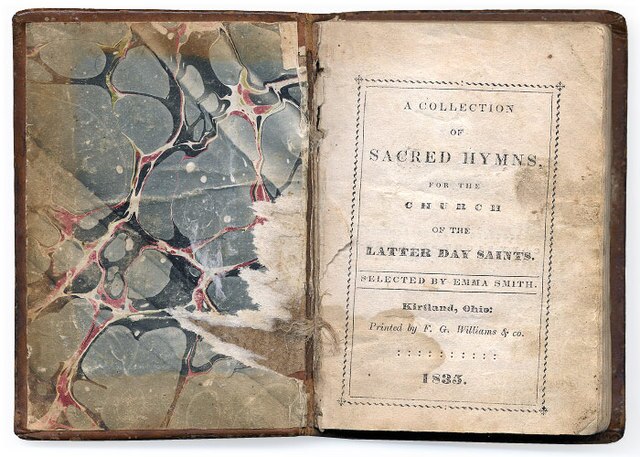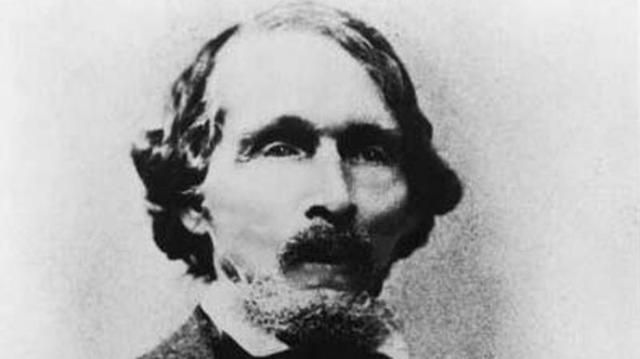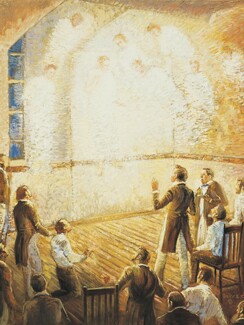Though the particular date it was written and the events that inspired "The Spirit of God" are unknown, there are many miraculous and incredible stories behind this beloved song and its author, William Wines Phelps, that have lead it to become one of the most recognizable and beloved Latter-day Saint hymns.
Here are five such remarkable stories and facts.
It preceded visions of angels, speaking in tongues, and many other miracles at the Kirtland Temple dedication.
Latter-day Saints were familiar with "The Spirit of God" before the dedication of the Kirtland Temple on March 27, 1836, but it was during this event that the hymn gained a new level of sacred significance.
A thousand people stood outside the temple an hour before the doors even opened, anxious to see the Lord's first holy house dedicated in this dispensation. Sidney Rigdon stood to address the Saints for two and a half hours before Joseph Smith gave the historic dedicatory prayer, now recorded in section 109 of the Doctrine and Covenants. "The Spirit of God" was only one of three hymns, all written by W. W. Phelps, sung at the Kirtland Temple dedication that day, along with "Now Let Us Rejoice" and "Adam-ondi-Ahman."
During the dedication and these sacred experiences, Latter-day Saints testified of seeing angels crowning the temple, of hearing heavenly voices that pierced their hearts, of speaking in tongues or revealing incredible prophecies, and of witnessing healings, miracles, and visions.
Later that evening, when Joseph Smith met with the priesthood quorums to give instruction, many more wonderful events transpired. About these sacred experiences the Prophet wrote, "George A. Smith arose and began to prophesy, when a noise was heard like the sound of a rushing mighty wind, which filled the Temple, and all the congregation simultaneously arose, being moved upon by an invisible power; many began to speak in tongues and prophesy; others saw glorious visions; and I beheld the Temple was filled with angels, which fact I declared to the congregation. The people of the neighborhood came running together (hearing an unusual sound within, and seeing a bright light like a pillar of fire resting upon the Temple), and were astonished at what was taking place" (History of the Church, 2:428).
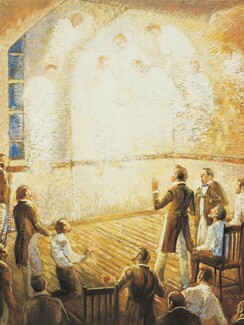
An artist's rendering of the events in the Kirtland Temple on March 27, 1836, from ChurchofJesusChrist.org.
Visions and divine manifestations continued to grace the history of the Kirtland Temple as the Savior himself appeared at "five different meetings held in the temple, and visions were given to many of both the Father and the Son" (Mormon Channel, "W. W. Phelps, Episode 22").
The song originally had six stanzas.
When first penned by W. W. Phelps and printed in the 1835 hymn book, "The Spirit of God" had six verses. Yet, when the hymn was printed in the Deseret Sunday School, only three verses were included, and our current hymnbook contains only four of the six verses. So, why the omission?
The obscurity of these omitted verses seemed to distract from the main message of the hymn, making these stanzas less applicable to the Saints (Mormon Channel, "W. W. Phelps, Episode 22").
The following are the original fourth and fifth verses that were omitted from the hymnbook:
"We'll wash and be washed and with oil be anointed
Withal not omitting the washing of feet,
For he that receiveth his penny appointed
Must surely be clean at the harvest of wheat.
"Old Israel, that flew from the world for his freedom,
Must come with the cloud and the pillar amain,
As Moses and Aaron, and Joshua lead him
And feed him on manna from heaven again."
The author, W. W. Phelps, was thrown into prison twice "to keep [him] from joining the Mormons."
Born in New Jersey in 1792, W. W. Phelps was a man of good education and standing. In fact, in his early life, he aspired to be the Lieutenant Governor of New York. On April 9, 1830—just three days after the Church was officially organized—Phelps purchased a copy of the Book of Mormon from Parley P. Pratt (Mormon Channel, "W. W. Phelps, Episode 22").
Shortly after, he sat and talked with Sidney Rigdon for 10 hours about the book and its sacred message and origins. During this time of questioning and conversion, Phelps saw considerable opposition. In fact, he was incarcerated twice "reportedly for other incidental causes, but in part, as he expressed it, 'to keep me from joining the Mormons'” (Mormon Channel, "W. W. Phelps, Episode 22").
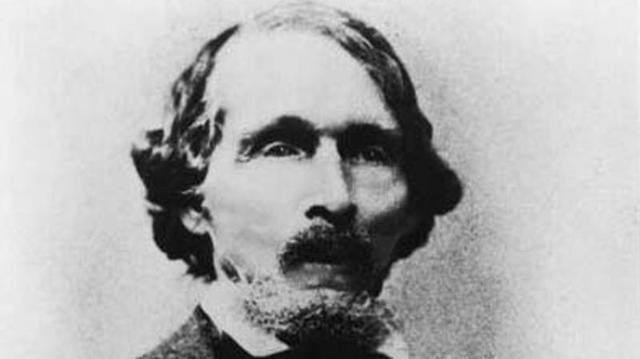
Image of W. W. Phelps from Mormon Channel.
But this didn't quench the faith of Brother Phelps, who joined the Saints in Kirtland in 1831. Upon arrival, he put himself at the disposal of the prophet, who then revealed what is now section 55 of the Doctrine and Covenants. In this revelation, he was called to assist Oliver Cowdery in the printing office and to travel to Missouri with the prophet and many apostles. He was promptly baptized and left to preach the gospel two days after receiving this call.
"The Spirit of God" has been played at the dedication of all the temples of the Church.
After the sacred experiences following the dedication of the Kirtland Temple, the Saints kept the tradition of singing "The Spirit of God" at every temple dedication. W. W. Phelps himself loved temples and sacrificed much to see these holy houses built, donating $1,500 to the building of temples in Kirtland and later in Far West, Missouri, where persecution kept a temple from ever being built (Stories of Our Mormon Hymns, J. Spencer Cornwall).
From the Kirtland Temple, which cost $75,000 and years of sacrifice and labor, to our modern temples today, which are built because of the sacrifice and tithes of Saints around the world, the consecration of every new temple has been celebrated with the inspiring words: "The Spirit of God like a fire is burning! The latter-day glory begins to come forth."
W. W. Phelps helped create the first hymnbook.
In addition to his work as a missionary, W. W. Phelps also established the Evening and Morning Star under the direction of Joseph Smith, became one of the stewards over many of the Prophet's revelations, was one of the scribes in translating the Book of Abraham from ancient records found with Egyptian mummies, and was charged with revising the first Latter-day Saint hymnal created by Emma Smith in 1835.
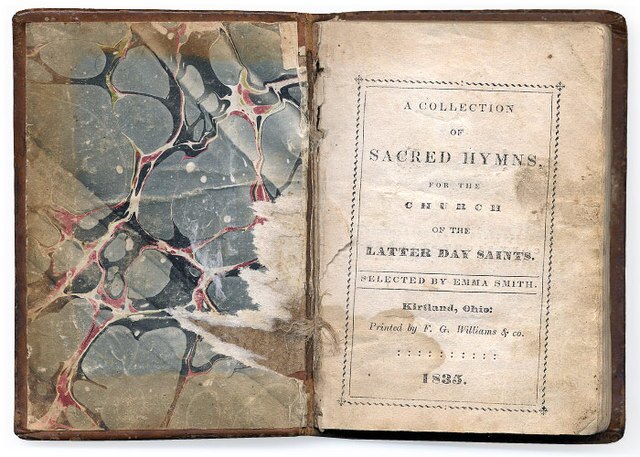
Image of an original 1835 Latter-day Saint hymnbook from ChurchofJesusChrist.org.
He himself contributed many hymns to this work, and 15 of his hymns are still in the hymnbook today.
W. W. Phelps was excommunicated from the Church in 1839.
Like many of the early Church leaders and members today, W. W. Phelps went through a period in his life when his testimony sputtered and languished. After his house was burned and his goods destroyed, Phelps' faith was not shaken. If anything, he was strengthened in his devotion to Heavenly Father and the Church.
It wasn't until later when his pride, interests, and intellect began to interfere with his membership in the Church. After refusing to repent of questionable behavior as part of a member of a stake presidency in Missouri, Phelps was finally excommunicated on March 17, 1839. It was then that Phelps learned the sorrow of being distanced from the Spirit and the beautiful power of redemption.
The Prophet openly forgave Phelps in 1840 and Phelps was restored to full membership again in 1841. After his restitution to the Church, the forgiveness Phelps received from Joseph Smith prompted him to later write the words of another classic hymn, "Praise to the Man," after Joseph's death.
Soon after his membership was restored, Phelps served a mission in the Eastern United States, became a special messenger for Joseph Smith, sustained Brigham Young after the Prophet's passing, and was one of the first—along with his wife Sally Waterman—to receive his endowments in the Nauvoo Temple. He also crossed the plains in 1848, was elected as a representative in the Utah legislature five times, and was one of the ordinance workers who gave the first endowments in the Salt Lake Valley.
Knowing just a little of the history behind these hymns and the man who penned them brings an entirely new dimension to these classics. Through the story of W. W. Phelps and the songs it inspired, it's easy to see, feel, and hear the Spirit of God, the sacrifice and faith of the Saints, and the Savior's love and forgiveness in action.
This story originally ran on LDS Living in 2016.
